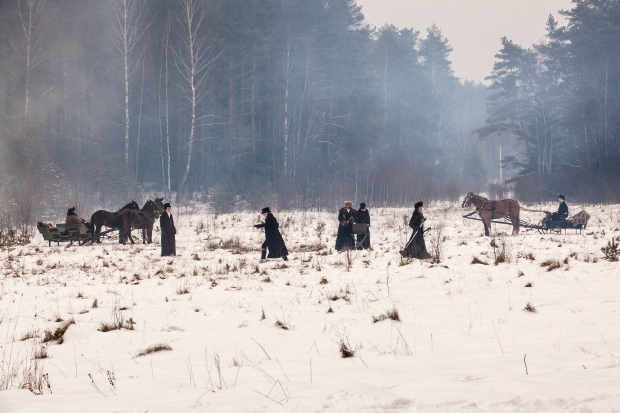Like Black Rod and the Poet Laureate, screenwriter Andrew Davies occupies one of the most colourful and arcane offices in public life. He is Pornographer-in-Chief, a title that was first bestowed by the journalist Paul Johnson on the boss of Channel 4, Sir Michael Grade. Davies has assumed the mantle by virtue (or vice) of sexing up cherished texts from the literary canon for the gratification of television producers. His adaptation of War and Peace has taken critical grapeshot for including incestuous romps that do not strictly feature in the novel. Simon Schama, who bashfully admits he has made his way to the end of the book only eight times, claims to have detected no evidence of a sexual relationship between siblings Anatole and Helene.
Davies’s oystery eyes glimmer — but is it with mischief? Or ennui? ‘I think he’s read it eight times and never noticed it. After my first reading, I hadn’t noticed it,’ he says. ‘Tolstoy did put one little scene in where Anatole is kissing Helene’s neck and shoulders, and Pierre (her husband) comes upon them and is alarmed. You think, that’s not your average brother and sister, is it? I felt quite happy in making a bit more of a scene of it. Quite often, sex is the motivating power in 19th-century books, for instance Middlemarch. The writers couldn’t write those scenes in their time but I can in ours.’
Davies, who is 79, says he had been putting off reading War and Peace until the BBC came calling. ‘I was frightened it would be disappointingly dull but I was electrified by how fresh and modern it felt.’ The snowy-haired screenwriter is sitting in the kind of deckchair that film directors used to have their names stencilled on to. We are in his Narnia-like writing den at the top of his Tudorbethan home in Kenilworth: the Davieses bought the house next door and knocked through, so the writer’s commute entails stepping through his bedroom cupboard into the corresponding fixture next door, and from there across a short stretch of floor to his desk.
How, some wonder, has he filleted Tolstoy’s epic to just six hours of screen time? He says, ‘When people watch it, it doesn’t feel rushed. The director [Tom Harper] has enabled us to have those moments when we can really slow down and live with the characters, understand what they’re thinking and feeling.
‘I think it’s a good thing to chop out the boring bits! Henry James called War and Peace a baggy monster, which meant it had things that James and modern critics would say shouldn’t be in novels at all: essays about history and philosophy and the theory of war, Tolstoy’s opinions, arguments with other historians. And you don’t need any of that as long as ideas emerge through characters, and you can make that happen.’
But we haven’t yet reached an end of Davies’s liberties with Tolstoy. He spent three years wrestling the book into shape for the small screen. ‘Eventually I took a pair of kitchen scissors and opened up the spine of the paperback and cut it through the middle. I could carry a chunk of it around in my jacket pocket quite easily after that.’
Did he offer up a silent apology to Tolstoy? ‘I did feel a bit guilty about it. I was brought up to be respectful to books. But I felt a wicked thrill about cutting the greatest book of all time into pieces.’
He says it’s an illusion to imagine that any adaptation can be faithful. ‘It’s always different, according to when it’s done, who’s doing it. Even the reading of a book is different from one person to another. It’s a collaboration between the author and the reader. I used to be an English teacher and I used to say to students, “Isn’t this a wonderful book?” This adapting job is a bit like that, but with millions of pounds of special effects.’
Davies launched Colin Firth’s career, with that clinging wet chemise in Pride and Prejudice. ‘He’s always very charming when I run into him but I can’t help feeling that he’s a bit irritated about having his career linked with this one part, in which he was so wonderful.’
Surely Davies receives a cheque from the actor every year. ‘That doesn’t happen, unfortunately. He looks as though he’s all right for a few bob, but then so am I.’ Indeed. Davies is reputedly the highest paid screenwriter in the business, with a long line of credits including Bleak House and Tipping the Velvet. A Davies screenplay is seldom knocked back, one imagines. What the writer taps out in Warwickshire tends to be what ends up on television sets around the country, more or less unchanged. ‘I can write “70,000 men engage in a furious battle, with bodies flying through the air and enormous explosions” and I’ll cheerfully stop working and go and have lunch. It’s not my job to make it look like this is happening on screen.’ But what does he say to the newspapers who accuse him of gratuitous rumpy-pumpy in his work?
‘I sometimes get a bit annoyed but it doesn’t usually last long. Sex is terribly interesting to everybody and it does help to sell shows, so even if the coverage is exaggerated in the papers, it usually does help with audience figures.’
Has he ever turned in a script and had the producer on the phone, demanding to know where all the fruity bits are? Davies laughs. ‘I don’t recall anybody doing that, no.’






Comments